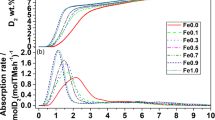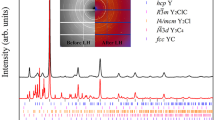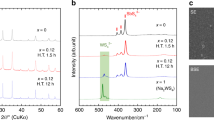Abstract
THE recent note of U. Croatto and A. G. Maddock1 pointing out the desirability of producing radio sulphur in its lowest, rather than in its highest, valency form, as it ordinarily occurs when potassium chloride is irradiated with slow neutrons, has prompted us to comment on the method used in this laboratory for producing H2S35 from neutron-irradiated potassium chloride.
This is a preview of subscription content, access via your institution
Access options
Subscribe to this journal
Receive 51 print issues and online access
$199.00 per year
only $3.90 per issue
Buy this article
- Purchase on Springer Link
- Instant access to full article PDF
Prices may be subject to local taxes which are calculated during checkout
Similar content being viewed by others
References
Croatto, U., and Maddock, A. G., Nature, 164, 613 (1949).
Koski, W. S., J. Amer. Chem. Soc., 71, 4042 (1949).
Author information
Authors and Affiliations
Rights and permissions
About this article
Cite this article
KOSKI, W. Preparation of High Specific Activity Hydrogen Sulphide (H2S35) from Neutron-Irradiated Potassium Chloride. Nature 165, 565–566 (1950). https://doi.org/10.1038/165565b0
Issue Date:
DOI: https://doi.org/10.1038/165565b0
Comments
By submitting a comment you agree to abide by our Terms and Community Guidelines. If you find something abusive or that does not comply with our terms or guidelines please flag it as inappropriate.



